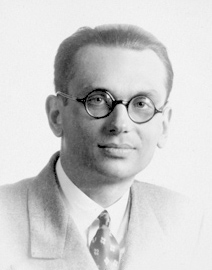John von Neumann was one of the greatest minds of the 20th century. After reading Stephen Wolfram’s Idea Makers: Personal Perspectives on the Lives & Ideas of Some Notable People which offers insights into von Neumann’s successes and missed opportunities, I wanted to share some reflections on his life and work.

John von Neumann ©️ Los Alamos National Laboratory
✅The Power of Interdisciplinary Thinking
Von Neumann didn’t just solve mathematical problems; he used math to revolutionize economics, quantum mechanics. His work reminds us that the most transformative ideas often emerge at the intersection of disciplines.
Cite”…But I’ve been told that he was never completely happy with his achievements because he thought he missed some great discoveries…”
”…I’ve been told that von Neumann was always disappointed that he had missed Gödel’s theorem…”
This raises an important question: What held von Neumann back from discovering Gödel’s incompleteness theorem?

Kurt Friedrich Gödel ©️Wikipedia
❌The Downside of Being Too Good at One Mental Model
Wolfram offers a fascinating analysis of von Neumann’s struggles. One of von Neumann’s greatest strengths - his unparalleled skill in mathematics - also became a weakness.
Cite“…he was so good at getting new results by the mathematical methods he knew that he was always going off to get more results, and never had a reason to pause and see whether some different conceptual framework should be considered…”
This is an intriguing point: being a master of interdisciplinary thinking doesn’t necessarily mean someone has diverse mental models.🤔 At least, this is Wolfram’s view. Von Neumann’s interdisciplinary work relied heavily on his mathematical expertise, which was shaped by the formalization trend in mathematics during the 1920s. This narrow focus may have limited his ability to explore alternative frameworks.
❌The Fear of Offending Others
Another factor that held von Neumann back, according to Wolfram, was his reluctance to challenge established ideas or risk offending his peers. For example, von Neumann was deeply familiar with the subject of mathematical logic and was close to discovering Gödel’s incompleteness theorem. However, he followed David Hilbert’s program and didn’t pursue the counterexamples that would have led him to Gödel’s groundbreaking result.

David Hilbert ©️Constance Reid, Springer 1970
😔Sometimes, progress requires questioning the status quo, even if it means ruffling a few feathers.
💡Lessons for Today
- Think Interdisciplinary: Break down the barriers between fields to find innovative solutions.
- Balance Depth and Width: Don’t get so caught up in solving immediate problems that you lose sight of the bigger picture in one mental model.
- Be Bold: Don’t shy away from challenging established ideas or taking intellectual risks.
😆Fun Fact
Cite“…he was close to a remarkable number of important mathematics-related discoveries of the twentieth century: Gödel’s theorem, Bell’s inequalities, information theory, Turing machines, computer languages—as well as my own more recent favorite core A New Kind of Science discovery of complexity from simple rules…”
It’s amusing to see Wolfram casually include his own work, A New Kind of Science, alongside groundbreaking discoveries like Turing machines and Gödel’s theorem. Oh, Stephen! 😆